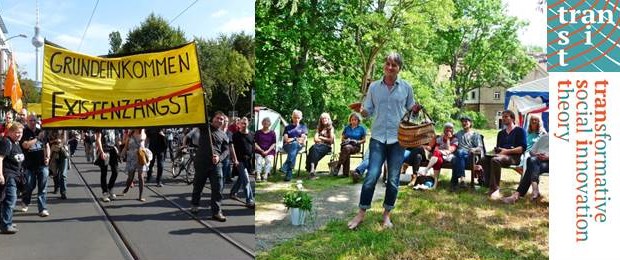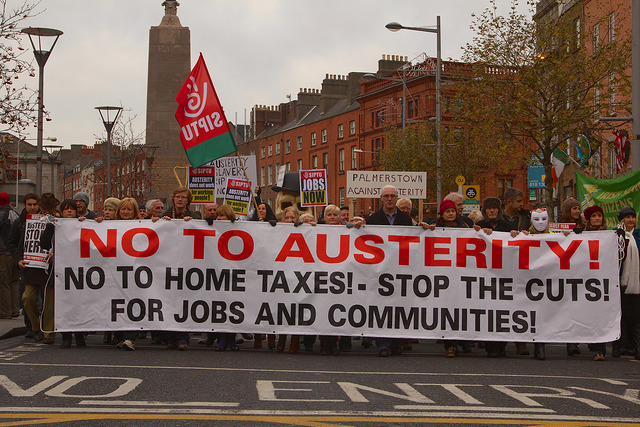What's harder? Raising 46.000 Euros in short time or at last starting a big debate about the future of a fossil fuel-dependent region? For the organizing team of the Degrowth Summer School, both were great challenges... Christopher Laumanns reports.
 Panel discussion in the town hall of Erkelenz. From left to right: Thorsten Moll (Inhabitant of Holzweiler, a village affected by the mining); Janna Aljets (Young friends of the Earth and Ende Gelände); Karin Walther (Facilitation); Manfred Maresch (Miners' trade union "IG BCE"); Dr. Stefan Gärtner (Institute for Work and Technology, Westfälische Hochschule).
As last year, one of the main subjects of the Summer School's programme was the question of the Rhenish lignite region's future. Here, degrowth concepts are put to the test: How much electricity does society need? How should it be produced? How can dirty industries be shut down in a socially just way? Which strategies are legitimate in the struggle for a good life for everyone? The main event about all this was the panel discussion "What comes after lignite? And how to pave a just transition?" in the town hall of the nearby city of Erkelenz. For the very first time lignite workers, climate activists and people from the region talked about how to design a phase out from coal. "Over 300 people came, which showed how important such events are", said Ruth Krohn of the Summer School's organizing team. "As the energy corporation RWE doesn't care about the consequences of lignite mining for the region, we have to get organized. That also offers the possibility of creating a whole different way of living together: In a social, ecological and democratic way, with decentralized energy supply and cooperative businesses." Stefan Gärtner, researcher on structural change at the Institute for Work and Technology at the Westfälische Hochschule emphasized: "The event today is a model for the future." He also pointed out that the workers should not just react to the decisions of RWE's managers, but should actively demand security for their futures, working together with the region's inhabitants and the climate justice movement. There were a lot of people from the region and workers among the 300 participants. The audience discussed vividly among themselves. The panel discussion was also well received in the media, west german state television filming it entirely. How strongly the Summer School contributed to a wide discussion about the necessary change of the region (and what this has to do with imperial ways of life, capitalist growth and trying out alternatives), can be seen in the following articles (all in German):
Rheinische Post: Bescheidener leben lernen and Kommentar: Proteste gegen Braunkohle - Naive Aktivisten
Aachener Zeitung: Zu lange weggeschaut
Deutsche Welle: Kampieren fürs Klima - und gegen Kohlestrom
WDR 5: Brauchen wir noch Braunkohle?
Panel discussion in the town hall of Erkelenz. From left to right: Thorsten Moll (Inhabitant of Holzweiler, a village affected by the mining); Janna Aljets (Young friends of the Earth and Ende Gelände); Karin Walther (Facilitation); Manfred Maresch (Miners' trade union "IG BCE"); Dr. Stefan Gärtner (Institute for Work and Technology, Westfälische Hochschule).
As last year, one of the main subjects of the Summer School's programme was the question of the Rhenish lignite region's future. Here, degrowth concepts are put to the test: How much electricity does society need? How should it be produced? How can dirty industries be shut down in a socially just way? Which strategies are legitimate in the struggle for a good life for everyone? The main event about all this was the panel discussion "What comes after lignite? And how to pave a just transition?" in the town hall of the nearby city of Erkelenz. For the very first time lignite workers, climate activists and people from the region talked about how to design a phase out from coal. "Over 300 people came, which showed how important such events are", said Ruth Krohn of the Summer School's organizing team. "As the energy corporation RWE doesn't care about the consequences of lignite mining for the region, we have to get organized. That also offers the possibility of creating a whole different way of living together: In a social, ecological and democratic way, with decentralized energy supply and cooperative businesses." Stefan Gärtner, researcher on structural change at the Institute for Work and Technology at the Westfälische Hochschule emphasized: "The event today is a model for the future." He also pointed out that the workers should not just react to the decisions of RWE's managers, but should actively demand security for their futures, working together with the region's inhabitants and the climate justice movement. There were a lot of people from the region and workers among the 300 participants. The audience discussed vividly among themselves. The panel discussion was also well received in the media, west german state television filming it entirely. How strongly the Summer School contributed to a wide discussion about the necessary change of the region (and what this has to do with imperial ways of life, capitalist growth and trying out alternatives), can be seen in the following articles (all in German):
Rheinische Post: Bescheidener leben lernen and Kommentar: Proteste gegen Braunkohle - Naive Aktivisten
Aachener Zeitung: Zu lange weggeschaut
Deutsche Welle: Kampieren fürs Klima - und gegen Kohlestrom
WDR 5: Brauchen wir noch Braunkohle?
 Bike tour to the stories of resistance in the Rhenish lignite region, listening to Gisela Irving. Photo: Adam Ronan (CC BY-SA)
Besides the panel discussion, there was a bike tour to kick off the Summer School. The tour visited "stories of the resistance" in the region. Especially older neighbours of the camp were visited, who looked back on a long history of struggling against forced resettlements, destruction of landscapes and coal burning. 81 year old Gisela Irving concluded after 40 years of resistance that a well connected, radical movement is necessary. The guided tours of the camp, offered by the Climate Camp, were well visited by neighbours and therefore this year the search for alternatives took place in much closer exchange with the local population. With this, a good basis has been laid out for future cooperation. A special highlight was the participation of mining trade unionis Manfred Maresch in on the of the Summer School's courses. The participants and course facilitators were very happy with the debate and Maresch commented: "I find it very pleasant, in what a respectful atmosphere conversations take place here - and that even though people have different opinions."
Bike tour to the stories of resistance in the Rhenish lignite region, listening to Gisela Irving. Photo: Adam Ronan (CC BY-SA)
Besides the panel discussion, there was a bike tour to kick off the Summer School. The tour visited "stories of the resistance" in the region. Especially older neighbours of the camp were visited, who looked back on a long history of struggling against forced resettlements, destruction of landscapes and coal burning. 81 year old Gisela Irving concluded after 40 years of resistance that a well connected, radical movement is necessary. The guided tours of the camp, offered by the Climate Camp, were well visited by neighbours and therefore this year the search for alternatives took place in much closer exchange with the local population. With this, a good basis has been laid out for future cooperation. A special highlight was the participation of mining trade unionis Manfred Maresch in on the of the Summer School's courses. The participants and course facilitators were very happy with the debate and Maresch commented: "I find it very pleasant, in what a respectful atmosphere conversations take place here - and that even though people have different opinions."
 Further focal points of the Summer School's programme were the "Psychology of Change" and the continuation of last year's topic of "Skills for System Change". The psychological courses were among the first to be fully booked, which made visible how large the interest within the Degrowth movement is not just to change the political frameworks, but also to investigate our own mental infrastructures of growth and competition. Thanks go to the Initiative Psychology in Environmentalism, who took part in putting the programme together. The participants of the radio course also showed their newly acquired skills for system change: Starting with building their own radio transmitters, they broadcast the first ever camp news at the end of the course. The broadcast was played live via loudspeakers during dinner, so that the group received an applause from around a thousand of listeners in the sunset.
Further focal points of the Summer School's programme were the "Psychology of Change" and the continuation of last year's topic of "Skills for System Change". The psychological courses were among the first to be fully booked, which made visible how large the interest within the Degrowth movement is not just to change the political frameworks, but also to investigate our own mental infrastructures of growth and competition. Thanks go to the Initiative Psychology in Environmentalism, who took part in putting the programme together. The participants of the radio course also showed their newly acquired skills for system change: Starting with building their own radio transmitters, they broadcast the first ever camp news at the end of the course. The broadcast was played live via loudspeakers during dinner, so that the group received an applause from around a thousand of listeners in the sunset.
 The Summer School got a lot of media attention - thus, among other things, contributing to a stronger debate on structural change in the Rhineland. Photo: Tim Lüdde (CC BY-NC)
There are more photos on the > Climate Camp's flickr-account
The best press review can be found on the > Homepage of Ende Gelände
Aerial image: Tim Wagner. Non-indexed photos: Klimacamp im Rheinland. Alle Bilder CC BY-SA 2.0
The Summer School got a lot of media attention - thus, among other things, contributing to a stronger debate on structural change in the Rhineland. Photo: Tim Lüdde (CC BY-NC)
There are more photos on the > Climate Camp's flickr-account
The best press review can be found on the > Homepage of Ende Gelände
Aerial image: Tim Wagner. Non-indexed photos: Klimacamp im Rheinland. Alle Bilder CC BY-SA 2.0

A Study on Transformative Social Innovation There are numerous grassroots movements and initiatives worldwide with the ambition to contribute to transformative change towards more sustainable, resilient and just societies. Many of them have a specific vision on the economy and relate to alternative visions of a ‘New Economy’. The research project TRANSIT highlights four prominent strands of ne...

How the conflation with neoliberalism and austerity unfairly reduces the idea of degrowth to absurdity – and where the degrowth movement can turn for answers to the crisis. The degrowth movement has been developed in response to neoliberal reality, neoliberalism's comically reductive view of human nature, its ecological blindness and the rise in social inequality it has brought about. Austerit...
Interview with Katja Kipping Katja Kipping is chairwoman of the German Left Party and Member of the German Parliament. Besides her engagement for good working conditions in her capacity as spokesperson for social affairs, she supports the exchange between party politics and civil society through engaging in social movements such as the network for unconditional basic income. For this interview...